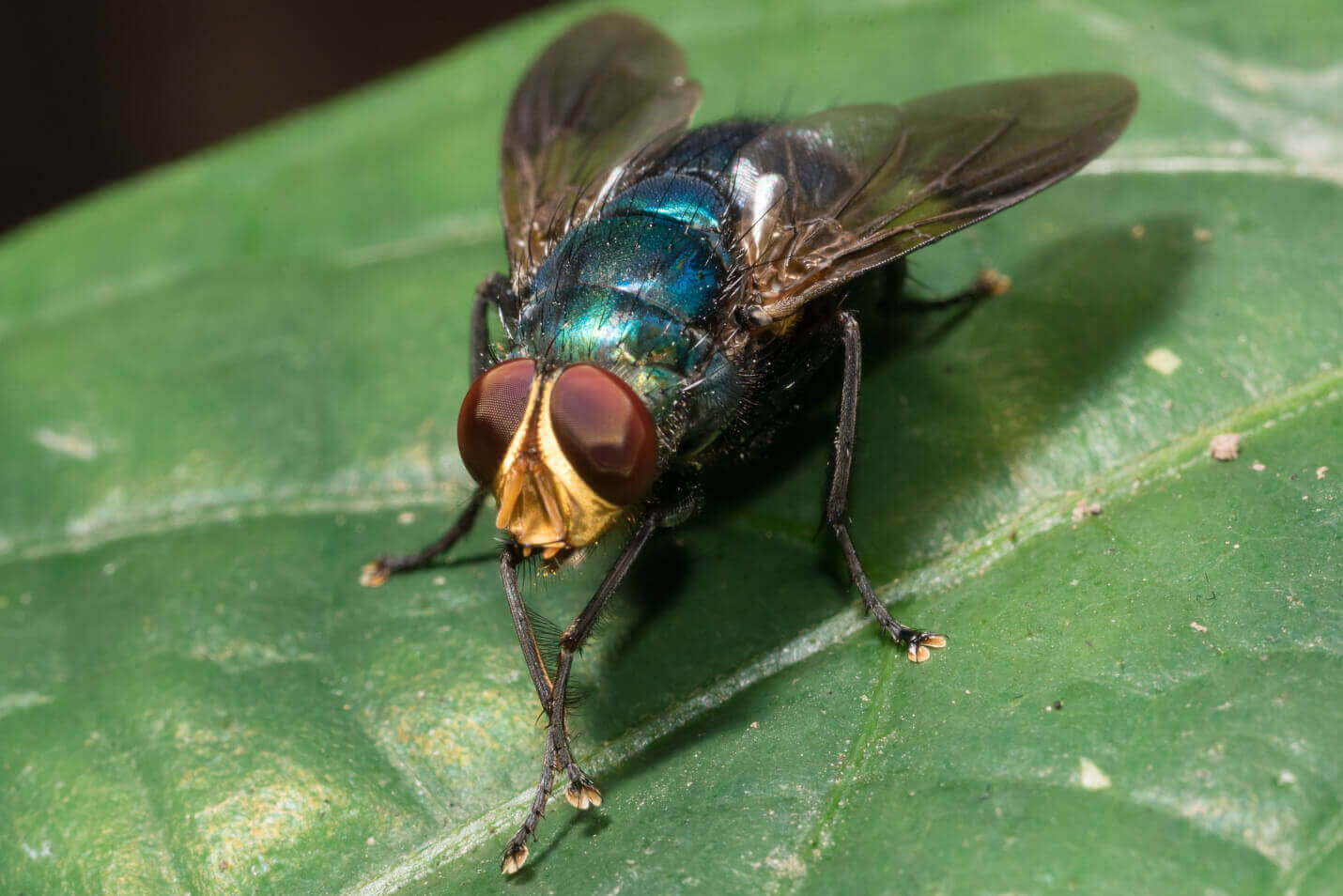Blow Fly Facts & Information
Everything you need to know about blow flies
What Do Blow Flies Look Like

The adult blow fly grows slightly larger than the house fly; between 1/8th and 5/8th of an inch in length. They can be metallic green, blue, black, or bronze in color. The blow fly’s worm-like larvae (maggots) are pale yellow to white in color. They are strong daytime fliers and are most active on sunny days. They are difficult to control but if you call the correct fly exterminator, they can give you many strategies you can perform to mitigate all flies in your home or business.As with most insects, the blow fly goes through a full metamorphosis (egg, larva, pupa, adult), though this particular fly species develops through three larval stages.
Once a female blow fly lays eggs in an animal carcass (she must consume protein first), wound, eyes, ears or nose, the first-stage larvae can hatch within 24 to 48 hours. Eggs are laid typically during the winter. Larvae develop through a second and third stage before pupating and then later emerging as adults.The full blow fly life cycle can take two to three weeks from egg to adult to complete, and most adults live from two weeks to a month.
Not the fly you have?
Once a female blow fly lays eggs in an animal carcass (she must consume protein first), wound, eyes, ears or nose, the first-stage larvae can hatch within 24 to 48 hours. Eggs are laid typically during the winter. Larvae develop through a second and third stage before pupating and then later emerging as adults.The full blow fly life cycle can take two to three weeks from egg to adult to complete, and most adults live from two weeks to a month.
Not the fly you have?
how did i get blow flies
Blow flies are found in all geographical areas of the world, so you shouldn’t be surprised if you see them in your home during the warm months. Common habitats for blow flies include humid areas with accessible layers of loose, damp soil, and trash or other decaying material where larvae can develop and find nourishment. They thrive best in warm, humid weather and eat primarily dead animals, wet garbage, and meat scraps. Since blow flies are attracted to all kinds of organic and other rotting materials that aren’t kept for long indoors, these flies are most often found outdoors. If you are seeing blow fly activity indoors, chances are there is something rotting nearby.

Sanitation is going to be your first and foremost defense against blow flies (and most other insect pests, like ants and cockroaches).
√ Keep trash securely sealed, and remove daily.
√ Remove animal waste in the yard regularly.
√ Keep your sink free of dirty dishes, and keep countertops wiped down and clean.
√ Inspect and repair screens on doors and windows to prevent flies from coming inside.
√ Keep trash securely sealed, and remove daily.
√ Remove animal waste in the yard regularly.
√ Keep your sink free of dirty dishes, and keep countertops wiped down and clean.
√ Inspect and repair screens on doors and windows to prevent flies from coming inside.
do blow flies cause
Blow flies, also known as bottle flies, are more than just a nuisance. They are extremely opportunistic, being the first to land on a dead animal. Whatever bacteria or pathogens they pick up from that animal can be transferred to wherever they land. Blow flies will also multiply quickly since the female blow fly can lay up to 2,000 eggs in their 10-25-day life cycle. Fly treatments can help but fly control is difficult to obtain unless you are making sanitation changes. We can educate you on what those are!Even though they blow flies do not bite humans, they are significant carriers of bacteria and germs. These flies can be dangerous to animals, however, if they are able to fester in and lay eggs in a wound or sore an animal may be carrying. The feeding larvae exacerbate existing wounds, and can end up making the animal very sick, and may even cause the animal to die if left untreated. Female Blow flies may also lay eggs in an animal’s eyes, ears, or nose.
How to keep blow flies out
Locate and eliminate all possible breeding sources. Blowflies feed and breed on dead animals and garbage. Removing their food source and where they lay eggs will reduce not only the blow flies you have now but will make your home or business less attractive to these pests in the future. Of course, killing adult flies will reduce infestation, but the elimination of the breeding areas is more important. Proper sanitation like emptying garbage cans and dumpsters regularly, cleaning them, and making sure they have tight fitting lids will help with blow flies (among many other pests). You should also make sure screens are repaired and placed tightly so there are no gaps or tears.
Why Western for blow fly control
We’re passionate about helping you control flies in your home because we live and work here – it’s our neighborhood, too. With our almost 100 years of experience keeping homes and businesses in Connecticut, Delaware, New Jersey, New York, and Pennsylvania safe from pests, Western has the experience you can trust.
100% Satisfaction Guarantee
24-Hour Guaranteed Response
Board Certified Entomologists
Say goodbye to blow flies.
GET A QUOTE
“We installed your Termite Defensive a number of years ago and have not seen even one termite since the system was installed.”
Edison, NJ
